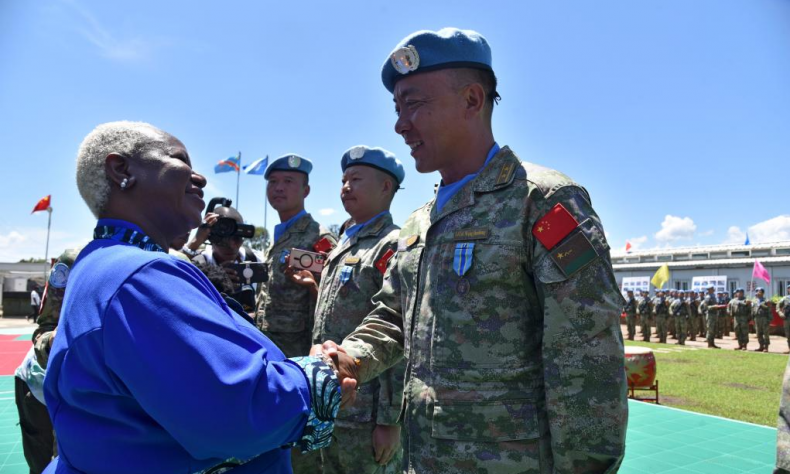Panchsheel for Peace

In the current global governance system, China’s Five Principles of Peaceful Coexistence have been seen as a solution to geopolitical and economic challenges.
There are two big conflicts going on in 2024 – one in Europe between Russia and Ukraine and the other in the Middle East between Israel and Palestine.
However, in reality, there are numerous regional conflicts going on around the world involving all of the permanent members of the United Nations Security Council except China, which are part of a wider great power conflict. The US, Russia, France, and the UK are taking part directly or through proxies. These powers have also formed regional military and economic alliances, including the Group of Seven and NATO.
There are also other undeclared regional conflicts in various parts of the world. In the Middle East, a low-intensity conflict has broken out between Israel and Lebanon, triggered by the war on Gaza. Similar battles have taken place between Israel and Syria, and between Israel and Iran.
In East Asia, tensions are intensifying on the Korea Peninsula. North Korea has fired several ballistic missiles since 2023 in protest against joint military drills between the US and South Korea. Last month, Russia and North Korea agreed on mutual support in case of external aggression, according to Russian media report.
In addition, conflicts have erupted between Israel and Yemen, and between the Sudanese army and rebel group Rapid Support Forces.
A brief conflict also broke out between Israel and Iran after Israel attacked the Iranian Embassy in Syria, killing seven people. In response, Iran fired ballistic missiles and unleashed dozens of drones, destroying part of a military base in Israel.
China’s stance
The various military conflicts mentioned above have one common factor: China’s absence. China has remained neutral in these wars. Instead, it has channelled its energy towards mediation or bringing warring parties together to find a peaceful solution.
China’s efforts bore fruit in the Middle East where it brokered peace between Saudi Arabia and Iran. The mediation ended decades of hostilities between the two regional powers. China has also tried to mediate between Russia and Ukraine, and between Israel and Palestine, albeit without success so far. In global forums, such as the UN General Assembly and the Security Council, China has either voted against or abstained from voting on wars.
China’s foreign policy has been anchored by the Five Principles for Peaceful Coexistence, put forward in 1954. On the 70th anniversary of these principles, it is worth reflecting on their impact in promoting global peace and security, and the unity of the developing world.
Also known as Panchsheel, the five principles guide China’s international relations and diplomatic conduct. They were first formalised in a treaty between China and India 70 years ago. They include mutual respect for territorial integrity and sovereignty, non-aggression, non-interference in each other’s internal affairs, equality and mutual benefit, and peaceful co-existence.

China’s growing engagement with Africa, the Middle East, East Asia and South America is a good barometer of the success of its foreign policy. Despite pushback from the US and its Western partners, China has steamed ahead with its Belt and Road Initiative (BRI), improved diplomatic and economic relations with many countries, and is now the biggest trading partner of many nations. Its global influence is growing alongside its role as a leading trading partner. As a result, a growing number of countries have ditched the US dollar as a global reserve currency in favour of the Chinese yuan. While the US economy is weighed down by the endless wars and de-dollarisation campaigns, China is seeing healthy economic growth.
As with many other countries, the Five Principles of Peaceful Coexistence have provided a framework for a respectful, non-interfering, and mutually beneficial relationship between China and South Africa. China’s emphasis on respecting sovereignty and territorial integrity aligns with its broader policy of non-interference. This principle has been particularly relevant in its relations with South Africa, a country that values its sovereignty and independence after its historical struggles with colonialism and apartheid. China has fostered a relationship built on mutual respect and equality by respecting South Africa’s sovereignty.
The principle of equality and mutual benefit is evident in the economic and trade relationships between China and South Africa. Both countries have sought to develop a beneficial partnership. China has become South Africa’s largest trading partner, and both countries are members of the BRICS grouping, which focuses on mutual development and cooperation. China has invested heavily in South Africa, particularly in the infrastructure, mining, and manufacturing sectors.
Both countries have collaborated in various international forums and organisations, advocating for a multipolar world and the interests of developing nations. Their cooperation is also evident in their joint efforts in peacekeeping and initiatives to promote regional stability in Africa. Chinese companies have been involved in significant infrastructure projects in South Africa, including roads, railways, and ports.
Diplomatic mediation
The Five Principles of Peaceful Coexistence have had a huge impact on global peace and development. China has actively participated in diplomatic mediation in conflicts such as those in the Middle East. Additionally, China is one of the most significant contributors to UN peacekeeping forces, which shows its commitment to maintaining global peace.
Through its investments and aid programmes, China has contributed to the economic development of many countries, particularly in Africa and Asia. These efforts have helped to create jobs, improve infrastructure, and boost economic growth, contributing to poverty alleviation and development.
By participating in and supporting international organisations and agreements, China has contributed to a rules-based international order. Its role in global trade organisations, climate change agreements, and international health initiatives exemplifies this commitment.
In the current global governance system where Western hegemony, regime changes and trade barriers (protectionism) are wreaking economic havoc in the Global South, China’s Five Principles of Peaceful Coexistence have been seen as a solution to geopolitical and economic challenges. China’s BRI, Global Development Initiative and Global Security Initiative are regarded as having put peace and development at the centre of international relations.
The author is Editor-in-Chief of African Times, Johannesburg, South Africa.
 Facebook
Facebook
 Twitter
Twitter
 Linkedin
Linkedin
 Google +
Google +










